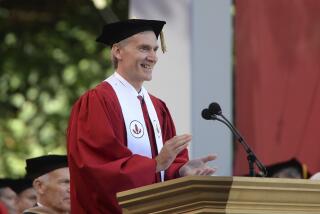Missteps Are Still Progress on Path to Discovery
- Share via
Oops.
It’s one of those worrisome sounds you don’t want to hear during surgery, or as your plane takes off.
Scientists and newspaper reporters tend to be especially oops-averse because their work is valued precisely for its reliability.
But as we all know, oops happens. And it’s not necessarily a bad thing.
“Science is inconceivable without mistakes,” a physicist friend said to me recently. “You have to push things until they break down. It’s the same with people: If we don’t push ourselves, we don’t know what our limits are.”
Then she added: “Being right stokes your ego, but being wrong teaches you something.”
She was telling me this in part because I was agonizing over two mistakes that slipped into a recent column, one entirely mine, one the inadvertent result of editing. Both were instructive.
In the first case, I’d written that while light can’t escape from a black hole, “gravity waves can and do.” I knew it was stretching the point unacceptably when I wrote it (gravity waves are emitted only from the edges of black holes), but I liked the way it sounded, and I told myself I’d go back and modify it later.
Lesson No. 1: If you don’t correct mistakes immediately, they have a way of settling in until even the most egregious errors begin to seem maybe-just-OK-after-all.
In the second case, the correct application of an editing rule that changed a “like” to a “such as” altered the sense so that the statement, in context, was wrong.
Lesson No. 2: Even good rules can have bad outcomes.
On the same day, I’d received an e-mail from a friend agonizing that he’d made a fool of himself by mistakenly believing he could restart a failed romantic relationship. I told him I was proud that he would take such risks. As a scientist, he knew it was true. There’s no progress without risk, and if you don’t make mistakes, chances are, you’re not risking enough.
What better time than this--my last Mind Over Matter column--to revisit some of my favorite personal oopsies, and what I (should have) learned from them.
My all-time favorite was the time I wrote a long article about scientific fraud and used the deliciously ambiguous example of the Millikan oil drop experiment. Robert Millikan was the physicist who founded Caltech. But with “fraud” resonating in mind, I referred to him throughout the piece as Michael Millikan--a twisted hybrid of Caltech’s founder and junk bond king Michael Milken, who pleaded guilty to fraud charges in 1990. (The one person who really seemed to enjoy this “oops” was Millikan’s grandson, whose name really is Michael.)
Next in line probably is the time I referred to a subatomic particle called “tau” as “tao.” (Tao of physics on the brain, no doubt.)
Lesson No. 3: Even when you think you’re concentrating on the task at hand, your brain may be pulling ideas in from entirely different contexts.
In other words: You don’t always know what you’re thinking (witness the Freudian slip).
My most humiliating mistake was the column I wrote about how easy it is to fool ourselves by listening to higher authorities--only to make an error because I listened to a higher authority. (I stated that an article on tabletop fusion appeared on the cover of the journal Science because someone “high up” told me it had. Actually, it ran inside.)
Lesson No. 4: Simply being aware of pitfalls doesn’t make you immune from them.
I also felt pretty silly a few weeks ago when I described the sun as a star “93 million light-years away,” only to have an editor save me. (“Er, did you really mean light-years?”)
Lesson No. 5: Difficult tasks take concentration. The routine seems so simple that we don’t think twice when we most need to.
Sometimes, of course, a mistake is a matter of perspective. After all, it was certainly an “oops” moment for the dinosaurs when that meteor hit Mexico, but it was pure serendipity for mammals like us. Genetic “mistakes” produce genius and beauty as well as disease. Alexander Fleming mistakenly let a foreign mold waft in through his open window and discovered penicillin.
And Einstein’s most famous mistake may have recently turned out to be a major discovery. Unaware that the universe was expanding, he inserted a term for a “repulsive force” into his equations to prevent the universe from collapsing. These days, cosmologists think this strange force may account for most of the energy in the cosmos.
This inescapable “oops factor” is wisely acknowledged in the “checks and balances” built into our system of government. If the president makes mistakes, the congress is supposed to correct them (and vice versa).
Alas, it’s not recognized in policies such as “zero tolerance” or the death penalty. By definition, they don’t allow for error.
Oops.






